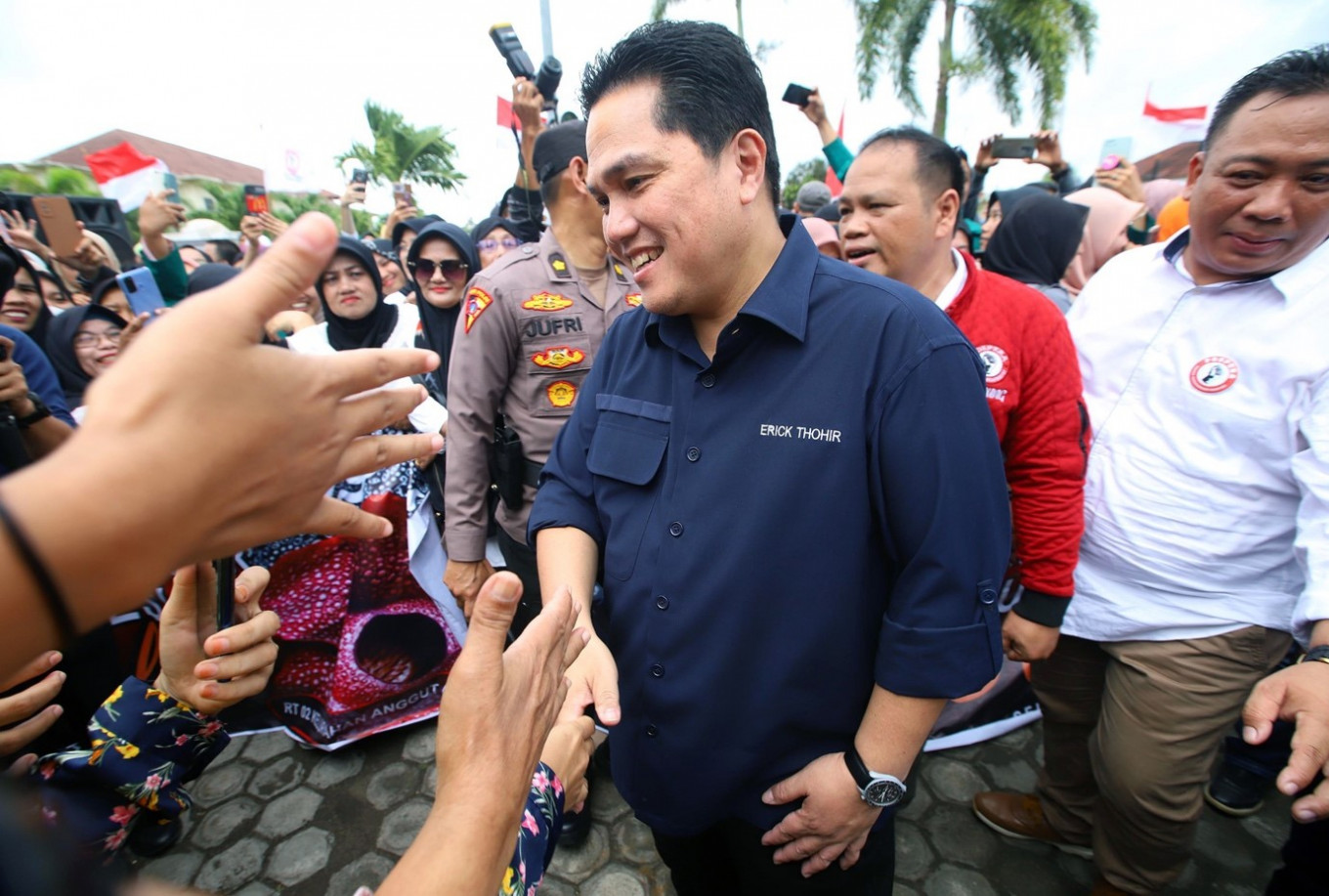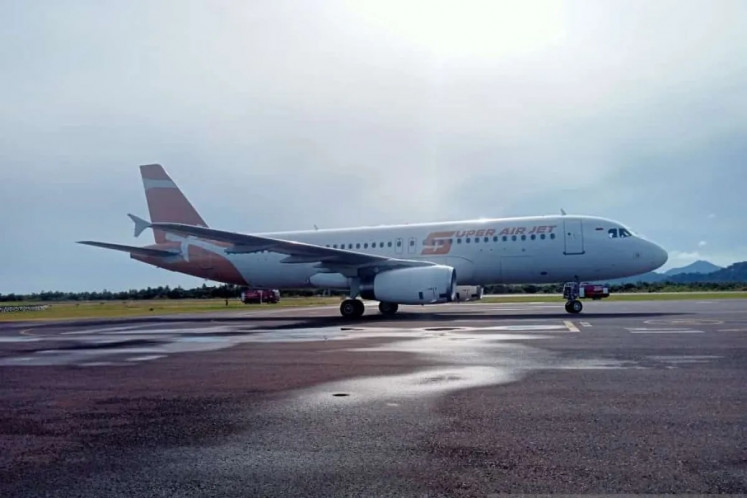Analysis: WIKA to receive Rp 8 trillion cash injection despite fraud allegations
The State-Owned Enterprises (SOEs) Ministry has proposed to the House of Representatives an increase in state-capital injection (PMN) sfor SOEs to be disbursed in 2024.
Change Size
 Minister of State-Owned Enterprises Erick Thohir was greeted by residents when he was about to take a tour at the Bung Karno Exile House, Bengkulu, Tuesday (24/1/2023). Erick Thohir together with the Governor of Bengkulu Rohidin Mersyah, Secretary General of Pena 98 Adian Napitupulu and General Chairperson of Pospera Mustar Bona Ventura will also restore history or return the location of Mrs. Fatmawati's house to its original location, to be precise at the current location of Bank BNI 46. Erick Thohir opened his speech with the success of the nation's struggle for independence, which until now the government continues to build a people's economy. (Courtesy of ET Team)
Minister of State-Owned Enterprises Erick Thohir was greeted by residents when he was about to take a tour at the Bung Karno Exile House, Bengkulu, Tuesday (24/1/2023). Erick Thohir together with the Governor of Bengkulu Rohidin Mersyah, Secretary General of Pena 98 Adian Napitupulu and General Chairperson of Pospera Mustar Bona Ventura will also restore history or return the location of Mrs. Fatmawati's house to its original location, to be precise at the current location of Bank BNI 46. Erick Thohir opened his speech with the success of the nation's struggle for independence, which until now the government continues to build a people's economy. (Courtesy of ET Team)
T
he State-Owned Enterprises (SOEs) Ministry has proposed to the House of Representatives an increase in state-capital injection (PMN) sfor SOEs to be disbursed in 2024 so that it would be able to bankroll cash-strapped PT Wijaya Karya (WIKA) that is currently under investigation for alleged manipulation of its financial reports. If agreed, the total PMN for this year would increase by Rp 24.04 trillion (US$1.61 billion), or 70 percent, from the initial budget of Rp 33.9 trillion to Rp 57.96 trillion.
Construction SOE WIKA was not even included in the initial proposal for the 2024 PMN. In the latest proposal tabled to the House on June 5, the SOEs Ministry included a Rp 8 trillion PMN for WIKA, which is tasked by the government to build a number of key infrastructure projects including the Jakarta-Bandung high-speed railway (HSR).
WIKA was suspected of manipulation after one of its creditors uncovered several irregularities, especially in their 2021 and 2022 financial reports. According to the SOE’s audited financial statement, they reported a net profit of Rp 117.7 billion in 2021, before suffering a net loss of Rp 59.6 billion in 2022. However, when they booked the net profit in 2021, they simultaneously suffered a net decrease in cash and cash equivalents by Rp 7.98 trillion.
Although it is possible for companies to record negative cash flows despite booking a net profit if most of its profits are recorded in receivables instead of cash, construction companies prefer to receive their payments in cash due to long gestation periods so that they can pay off accrued debts. This is especially true in WIKA’s case as the company’s debt reached Rp 12.6 trillion in March and it requested a standstill to 15 different banks in April. Furthermore, WIKA’s financial troubles have delayed construction of the Jakarta-Bandung HSR. The SOE’s late payments to creditors led some banks to freeze a number of HSR accounts, deterring new banks from funding the project.
The SOEs Ministry’s languid response to the allegations has also been adding fuel to the fire. The Development Finance Comptroller (BPKP) did not get assigned to audit WIKA’s finances until recently and only as a prerequisite for receiving the Rp 8 trillion PMN. Meanwhile, the allegations of fraud have been circulating for some time.
In addition to WIKA, the SOEs Ministry increased the PMN allocations for another construction SOE PT Hutama Karya by Rp 12.5 trillion, from an initial budget of Rp 10 trillion to Rp 22.5 trillion, and for newly established state-owned insurance holding company Indonesian Financial Group (IFG) by Rp 3.56 trillion, from an initial budget of Rp 3 trillion to Rp 6.56 trillion.
SOEs Minister Erick Thohir explained that the additional Rp 24.04 trillion increase to the PMN was not a sudden decision and was discussed in an internal meeting with President Joko “Jokowi” Widodo on April 28. The addition of WIKA is to reinforce its capital security, while the other two were necessary for enterprises to complete new high priority projects that were assigned to them. In the case of Hutama Karya, it will be taking over the Bogor-Ciawi-Sukabumi (Bocimi) and Kayu Agung-Palembang-Belitung toll roads from another construction SOE PT Waskita Karya. Meanwhile in IFG’s case, it was assigned to resolve policy migrations from defrauded state-owned insurer PT Asuransi Jiwasraya.
What’s more
WIKA’s inclusion in the PMN list gives credence to concerns regarding the lack of accountability from SOEs and that the SOEs Ministry is too quick to resort to the PMN. Even if the fraud allegations against WIKA are dropped, it does not change the fact the company has failed to punctually pay off at least 15 creditors.
Even before Waskita Karya president director Destiawan Soewardjono was named a suspect in a case of funding fictitious projects and embezzling supply chain financing (SCF), which prompted the Finance Ministry to withhold a Rp 3 trillion PMN for Waskita. The Finance Ministry’s State Assets Director General Rionald Silaban at the time cited Waskita’s low sales and high default risk as the main reason behind the decision to withhold state funding. Not long afterward in May, Rionald’s concerns would be confirmed when Waskita finally defaulted on its bond interest payments for that period. (Read: IDX suspends trading of Waskita’s shares once again)
Economists and pundits have been pointing out that the SOEs Ministry has not been treating the PMN as public investments, which are meant to be compensated in the form of added economic value from infrastructure or other public projects. Instead, they have been more commonly used as a bail out to save struggling SOEs.
The SOEs to receive PMN in 2024 and their total cash amounts in the initial proposal:
|
SOE |
Cash amount (in Indonesian rupiah) |
|
Perusahaan Listrik Negara (PLN) |
10 trillion |
|
Hutama Karya |
10 trillion |
|
Pelayaran Nasional Indonesia (Pelni) |
4 trillion |
|
Indonesia Financial Group (IFG) |
3 trillion |
|
Industri Kereta Api (INKA) |
3 trillion |
|
Rekayasa Industri (Rekin) |
2 trillion |
|
ID Food |
1.9 trillion |
|
Total |
33.9 trillion |
The SOEs to receive PMN in 2024 and their total cash amounts in the proposal made to the House of Representatives on June 5:
|
SOEs |
Cash amount (in Indonesian rupiah) |
|
Perusahaan Listrik Negara (PLN) |
10 trillion |
|
Hutama Karya |
22.5 trillion |
|
Pelayaran Nasional Indonesia (Pelni) |
4 trillion |
|
Indonesia Financial Group (IFG) |
6.56 trillion |
|
Industri Kereta Api (INKA) |
3 trillion |
|
Rekayasa Industri (Rekin) |
2 trillion |
|
ID Food |
1.9 trillion |
|
Wijaya Karya (WIKA) |
8 trillion |
|
Total |
57.96 trillion |
What we’ve heard
Issues surrounding state-owned businesses that will receive the additional State Capital Injection (PMN) of Rp 57.96 trillion for 2024, and State-Owned Enterprises (SOEs) Minister Erick Thohir's plans to propose additional PMN for next year raises questions.
Out of the many PMN that have been disbursed, dozens of SOE recipients did not receive the PMN funds between 2015 and 2021. "For six years, less than 70 percent was realized for each SOE," said a source. Two years ago, the absorbed funds did not reach 50 percent.
Furthermore, several projects do not have priority allocations and SOEs have borne the burden of long-term loan interests. This happened to state-owned electricity company PLN and Hutama Karya, accruing Rp 2.86 trillion and Rp 529 billion, respectively, in payable interests. Most sections of Hutama Karya’s Trans-Sumatra toll road are not feasible for construction due to low liquidity.
Another crucial issue is that the SOEs Ministry has not optimally verified each PMN proposal from the SOEs. The verification method to assess the accuracy of the PMN value submitted by SOEs have so far been insufficient. In addition, the SOEs Ministry lacks standards for determining the purpose of the distributed PMN.
As a result, IFG Life Insurance used PMN funds to pay overdue claims because, at the time, the funds had not been deposited into the company's account. A similar situation occurred with Waskita Karya. Due to the lack of adequate verification methods, the SOEs Ministry was unaware that a portion of the claims Waskita Karya used for payments were from PMN funds. The PMN funds allocated for construction were not meant to be used to pay claims from other companies.
Disclaimer
This content is provided by Tenggara Strategics in collaboration with The Jakarta Post to serve the latest comprehensive and reliable analysis on Indonesia’s political and business landscape. Access the latest edition of Tenggara Backgrounder to read the articles listed below:
Politics
- NasDem in the spotlight yet again over graft allegations
- Johnny fights back, offers himself as justice collaborator
- Indonesia's penchant for secondhand weaponry
- Court ruling on voting system gives respite to democracy
Business and Economy
- Golden Indonesia 2045 development plan prepared for next presidents
- RI to run market trial for 5-percent bioethanol mix
- RI maintains trade surplus despite surge in imports










